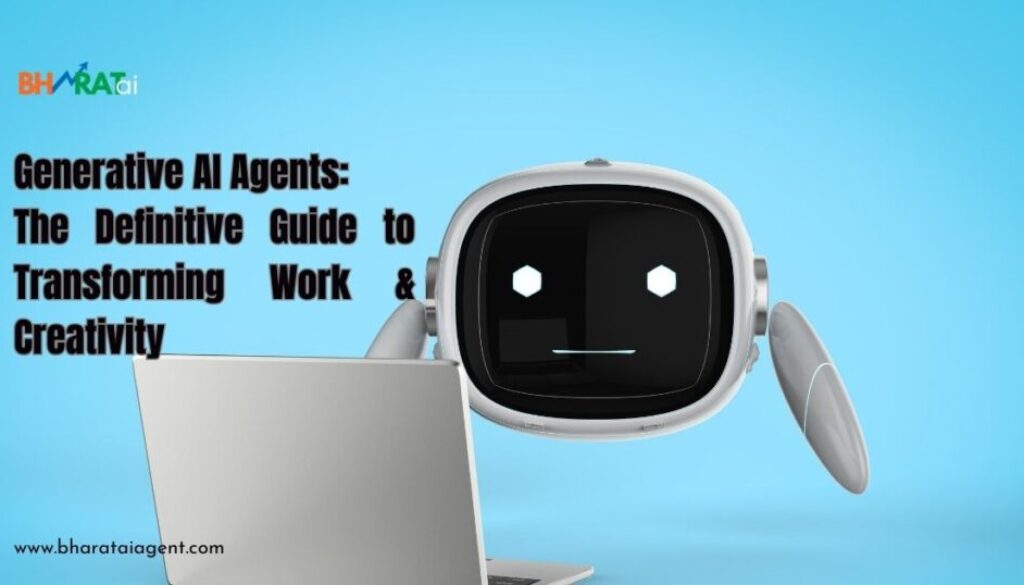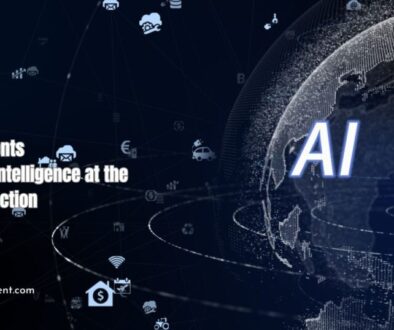Generative AI Agents in 2025: The Definitive Guide to Transforming Work & Creativity
Introduction
Generative AI Agents have evolved into transformative tools that autonomously create original, high-quality content, streamline workflows, and enhance productivity. From automated content creation and intelligent design to personalized marketing, these agents are redefining creativity and efficiency across industries.
This comprehensive guide, structured and optimized according to Google’s Search Generative Experience (SGE), covers:
-
What exactly are Generative AI Agents?
-
Core functionalities and how they operate
-
Real-world applications across industries
-
Latest innovations (2025)
-
Benefits and ethical considerations
-
Future trends and predictions
-
Clear answers to frequently asked questions
What are Generative AI Agents?
Generative AI Agents are advanced artificial intelligence systems capable of autonomously creating original, contextually relevant content across multiple formats—including text, images, videos, and software code. Utilizing cutting-edge generative models such as GPT-4 Turbo, Google Gemini 1.5, and multimodal tools like Midjourney Video, these agents automate creative processes and generate outputs tailored precisely to user requirements.
Core Functionalities of Generative AI Agents
Generative AI agents possess several powerful functionalities:
✅ 1. Content Generation & Writing
-
Automatically creating high-quality blogs, articles, scripts, social media posts, and emails tailored to audience preferences.
-
Example: Businesses using GPT-4 Turbo to instantly generate engaging marketing content, saving substantial time and resources.
✅ 2. Creative & Visual Media Generation
-
Producing original visuals, graphics, videos, animations, and virtual environments autonomously.
-
Example: Platforms like Midjourney Video and Runway AI enabling marketers to produce professional-quality videos quickly and affordably.
✅ 3. Software & Code Automation
-
Autonomously generating, optimizing, and debugging software code, significantly enhancing software development speed.
-
Example: Indian IT firms utilizing GitHub Copilot X and GPT-4 Turbo to rapidly develop and improve software applications.
✅ 4. Personalized User Experiences
-
Creating hyper-personalized content and interactions dynamically based on real-time user behavior and preferences.
-
Example: E-commerce brands using generative agents to deliver customized shopping recommendations, personalized ads, and targeted promotions instantly.
✅ 5. Synthetic Data Generation
-
Generating secure, realistic synthetic datasets to improve AI training, testing, and data privacy.
-
Example: Healthcare and finance industries leveraging generative AI to create synthetic datasets, enhancing AI model accuracy and maintaining data privacy.
Real-world Applications of Generative AI Agents (2025)
Generative AI agents deliver tangible value across diverse sectors, including:
-
Marketing & Advertising: Instant generation of personalized marketing materials, ads, and customer engagement content.
-
Content & Media: Automated writing, scripting, and multimedia content production.
-
Technology & Software Development: Accelerated coding, software testing, and debugging.
-
E-commerce & Retail: Hyper-personalized customer experiences and automated product content creation.
-
Education & Training: Customized learning modules, personalized tutorials, and interactive course content.
-
Healthcare & Pharmaceuticals: Synthetic data generation, drug discovery simulations, and personalized patient content.
Latest Innovations in Generative AI Agents-2025
Significant recent innovations include:
-
Advanced Multimodal Models: Integrated generative AI models capable of creating seamless interactions across text, images, audio, and video (GPT-4 Turbo Multimodal).
-
Emotionally Intelligent Generative AI: AI agents capable of creating empathetic, emotionally resonant content tailored to users’ emotional contexts.
-
Edge-Based Generative AI: Lightweight, real-time generative AI deployed directly on devices, enhancing privacy and responsiveness.
-
Quantum-Enhanced Generative AI: Early integration of quantum computing significantly accelerating generative capabilities and complexity.
-
Ethical & Explainable AI: Increasing transparency, reducing biases, and providing clear accountability in generative AI outputs.
Benefits of Adopting Generative AI Agents
Organizations and individuals gain substantial advantages from generative AI:
-
Efficiency & Speed: Accelerates content creation, software development, and innovation.
-
Cost Reduction: Significantly reduces the cost of manual creative processes and content production.
-
Enhanced Creativity & Innovation: Provides a powerful catalyst for innovative ideas, concepts, and creative output.
-
Personalized User Experiences: Enables highly tailored, engaging interactions with customers and users.
-
Improved Productivity: Allows teams to focus on higher-value tasks while AI handles repetitive creative processes.
Ethical Considerations and Challenges
Generative AI agents also introduce several ethical challenges:
-
Content Authenticity & Misinformation: Ensuring accuracy and preventing misuse like deepfakes or fake news.
-
Data Privacy & Security: Responsible handling and safeguarding of sensitive information.
-
Bias Mitigation: Preventing and addressing biases embedded in generative outputs.
-
Transparency & Accountability: Clear attribution and explainability of AI-generated content.
Future Trends in Generative AI Agents
Looking ahead, generative AI is poised for further evolution, including:
-
Massive Adoption of AI-generated Virtual Worlds: Expanded use in virtual reality (VR) and the Metaverse.
-
Proactive Generative AI Interactions: AI agents autonomously initiating and creating highly personalized, proactive user experiences.
-
Quantum-Powered Generative Models: Quantum computing integration enhancing generative speed, complexity, and personalization.
-
Emotionally Enhanced AI: Wider adoption of emotionally intelligent AI agents for personalized content generation and empathetic interactions.
FAQs: Generative AI Agents
Q1: What exactly are Generative AI Agents?
Generative AI Agents are advanced AI systems capable of autonomously creating original content such as text, images, videos, software code, and personalized user experiences using powerful neural networks and machine learning models.
Q2: How do Generative AI Agents differ from traditional AI tools?
Unlike traditional AI tools designed for specific, predefined tasks, generative AI agents autonomously create diverse, original, and contextually adaptive content with minimal human input.
Q3: Can small businesses benefit from Generative AI Agents?
Absolutely. Generative AI is now affordable and scalable, making it practical for small businesses to streamline content creation, marketing, customer engagement, and product development.
Q4: What are common everyday examples of Generative AI Agents?
Examples include AI-generated blog posts, personalized email marketing, automated video creation, AI-driven social media content, and smart coding assistants.
Q5: What ethical considerations should be kept in mind with Generative AI?
Businesses and individuals should consider content authenticity, transparency, data privacy, fairness, bias mitigation, and accountability to ethically use generative AI tools.
Conclusion
Generative AI Agents have profoundly transformed how businesses and individuals approach creativity, productivity, and innovation. Leveraging these powerful tools responsibly positions organizations to excel in a rapidly evolving digital economy.
#GenerativeAI #AIAgents #AIContentCreation #GPT4Turbo #AI2025 #AIInnovation #TechTrends #AIProductivity #FutureTech #EmotionAI #QuantumAI #MultimodalAI
Generative AI Agents 2025
AI-generated Content
GPT-4 Turbo
Multimodal Generative AI
AI-driven Productivity
Personalized AI Experiences
Ethical Generative AI
Future of AI Agents
Quantum Generative AI
AI Innovation India
What are Generative AI Agents
AI in Creative Industries
AI-generated Video and Images
Generative AI Benefits
Ethical Concerns AI
AI Personalization Tools
AI-generated Marketing Content
Quantum Computing AI Benefits
Generative AI Challenges
Emotionally Intelligent AI




